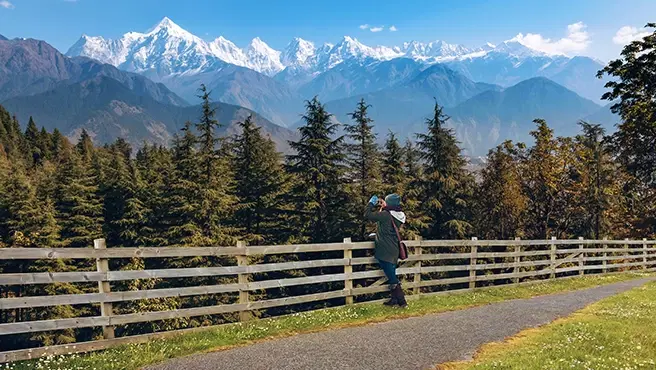
Hotels
•04 min read

India is home to a world of natural wonders. The country's expansive national parks are a testament to its rich biodiversity and stunning landscapes. These parks are not only sanctuaries for animal and plant life, but they are also places that encourage eco-tourism and contribute to wildlife conservation. This blog offers you a comprehensive checklist to answer the question, "how many national park in india?" You will also learn about famous parks, wildlife destinations, and eco-tourism opportunities.
National parks are protected areas dedicated to preserving nature and wildlife. In India, they play a key role in safeguarding fragile ecosystems. These parks are managed under strict legal guidelines that emphasize conservation. Their protection helps to maintain the balance between human activities and nature, ensuring that rare species and natural habitats continue to thrive.
The history of national parks in India began with the establishment of Jim Corbett National Park. Over the decades, more parks have been added to protect diverse landscapes. From dense tropical forests to high mountainous regions, each park has a story to tell. This evolution highlights the growing importance of conservation and the tourism benefits for local communities.
India currently boasts 106 national parks as of 2023. Each park holds its own charm and importance for the overall environment. The most recent additions include the 105th and 106th parks, which were established with the aim of preserving even more unique ecosystems. These updates reflect the country's commitment to preserving its natural heritage.
Across India, national parks are spread out over various regions. Here is a concise breakdown:
North: Explore parks such as Hemis in Ladakh, known for its vast landscapes.
South: Experience parks like Periyar that offer a blend of wildlife and scenic beauty.
East: Discover gems like Kaziranga in Assam, famous for its one-horned rhinoceros.
West: Visit parks in Rajasthan, including Ranthambore, known for its tiger safaris.
This state-wise list provides a taste of the list of national parks in India and highlights the diverse natural beauty found across the country.

Some parks stand out for their unique features and global acclaim. Jim Corbett, Kaziranga, Sundarbans, Bandipur, and Gir are among the famous national parks in India. Each park has something special to offer. Jim Corbett is renowned for its tiger population, while Kaziranga holds a major share of the world's one-horned rhinoceros. Sundarbans is famous for its unique mangrove ecosystems, and Gir is the sole home of the Asiatic lion.
The best national parks for tourists in India feature excellent safari experiences and eco-tourism activities. These parks are known for easy accessibility and well-organized tours. Visitors can plan trips during the best seasons for wildlife spotting. The parks offer guided jeep safaris, nature walks, and bird watching opportunities. Nearby accommodations provide convenient bases for exploration, making them top choices for an unforgettable wildlife adventure.
Insight Corner
"Did you know? Kaziranga National Park in Assam is home to two-thirds of the world's one-horned rhinoceros population, making it one of the most essential wildlife conservation areas globally!"
It is important to understand the difference between national parks and wildlife sanctuaries. National parks have strict rules to ensure undisturbed ecosystems, while Indian wildlife sanctuaries allow limited human activities and community involvement. Sanctuaries such as Bharatpur Bird Sanctuary and Periyar Wildlife Sanctuary provide safe havens for birds and other wildlife. They play a vital role in the conservation of species that rely on these environments.
Eco-tourism has grown rapidly in and around national parks and sanctuaries. Travelers can enjoy various activities such as guided safaris, bird watching, and nature trails. Many tours also include conservation programs that educate visitors about the importance of protecting wildlife. Eco-tourism in India offers a chance to connect with nature while contributing to sustainable travel practices.
Before visiting any national park, planning is key. Know the best season to visit, which is often during the cooler months. Check for the necessary permits and pack essentials such as water, sunscreen, and a camera to capture the moment. A sensible itinerary helps you enjoy the journey and ensures you do not miss out on any highlights.

Safari experiences in Indian national parks are a major highlight for many travelers. Options include jeep safaris, elephant safaris, and even boat safaris in riverine parks. Each type of safari offers a different perspective on the wildlife and the surroundings. In some parks, you can observe majestic tigers, playful elephants, and rare species of birds in their natural habitat.
Staying near a national park enhances the travel experience. There are eco-friendly lodges and more luxurious options available in the vicinity of many parks. These accommodations provide comfort and a chance to immerse yourself in nature. Rest and relaxation after a day of adventure makes every journey even more memorable. The focus remains on ethical tourism that respects the environment and local culture.
There are currently 106 national parks in India as of 2023.
The 105th national park in India is yet to be widely publicized, reflecting ongoing efforts to expand protected areas.
National parks have stricter regulations focused solely on conservation. In contrast, wildlife sanctuaries allow limited human activities alongside the conservation of wildlife.
Hemis National Park in Ladakh is the largest, spanning over 4,400 square kilometers.
Madhya Pradesh is known to have the highest number, with 11 national parks.
India's national parks are treasures that showcase the nation's rich biodiversity. With 106 parks currently protecting diverse ecosystems, each park plays a key role in conservation. These protected areas offer inspiring wildlife encounters and eco-tourism adventures. From iconic parks like Jim Corbett and Kaziranga to soothing wildlife sanctuaries, every nature lover has a new adventure waiting. Let this checklist be your guide to discovering the vast and varied natural beauty that defines India. Enjoy the journey and embrace the wild wonders that await in each corner of this incredible country.